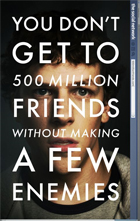The Social Network
|  Combining the dizzying pace of a legal thriller with the rapid-fire verbal wit of a screwball comedy and the dramatic betrayals of a Shakespearean tragedy, David Fincher’s The Social Network gives us an illuminating, albeit highly fictionalized, account of how a 19-year-old Harvard student named Mark Zuckerburg started what would become one of the technological and social turning points of the 21st century. Born in a dorm room over bottles of beer and lingering resentment over female rejection (at least as depicted in the film), the social networking site Facebook has, in a mere seven years, forever altered the proverbial face of online social interaction, the kind of fundamental game changer that comes along once every couple of decades, if not centuries. Combining the dizzying pace of a legal thriller with the rapid-fire verbal wit of a screwball comedy and the dramatic betrayals of a Shakespearean tragedy, David Fincher’s The Social Network gives us an illuminating, albeit highly fictionalized, account of how a 19-year-old Harvard student named Mark Zuckerburg started what would become one of the technological and social turning points of the 21st century. Born in a dorm room over bottles of beer and lingering resentment over female rejection (at least as depicted in the film), the social networking site Facebook has, in a mere seven years, forever altered the proverbial face of online social interaction, the kind of fundamental game changer that comes along once every couple of decades, if not centuries.The film, scripted by playwright and screenwriter Aaron Sorkin (The West Wing) from the factually based book by Ben Mezrich (who also penned the source book for 21, about MIT students using their math skills at the Las Vegas poker tables), is structured around depositions being taken in two separate lawsuits brought against Zuckerburg, one for supposedly stealing the idea for Facebook and one for cutting out one of its founders. As played by Jesse Eisenberg (Zombieland), Zuckerburg is a fast-talking, inwardly directed opportunist with deep-seated self-esteem issues that cause him to lash out with intellectual arrogance at everyone around him, including those who offer genuine friendship. It’s a tricky role, as we must have some sympathy for the character even as he willfully alienates himself with a mixture of stand-offish posturing and socially deaf wordplay that suggests he is unaware of anyone’s feelings but his own. In this regard, Eisenberg’s performance is a triumph, baiting our derision while feeding our underlying desire to see the underdog--no matter how obnoxious he may be--undercut the powers that be. Moving deftly between a present-tense depiction of the depositions in the two lawsuits and a barely past-tense depiction of the events beginning in the fall of 2003 that led to Facebook’s development, Sorkin’s screenplay cleverly builds subjectivity into its very structure, thus immediately deflecting charges of fictionalization and hyperbole. After all, virtually everything we see on screen is a recreation of someone’s testimony, most of which is drawn directly from the book. Granted, Sorkin’s dialogue is clearly a cinematic conceit that wears its creative license on its sleeve; like the screwball comedies of the ’30s and ’40s, the characters’ wordplay is far too good to be true, but it is so delicious that it short-circuits our defenses. We want to hear more. Zuckerburg’s eventual enemies include Eduardo Saverin (Andrew Garfield), his one true friend who was one of Facebook’s initial founders and its CFO before it got too big and he was pushed out, largely due to Zuckerburg’s increasing alliance with Sean Parker (Justin Timberlake), the self-aggrandizing, smooth-talking co-founder of Napster who immediately recognized Facebook’s potential and wanted in. Saverin, fed by too many college business courses, wanted to steer the web site into immediate profitability via advertising, while Zuckerburg and Parker (wisely, as it turned out) recognized that turning it into a haven of pop-up ads would doom it. As Zuckerburg continually points out, what Facebook has going for it is its coolness factor (and the way in which it uses computer programming to institutionalize narcissism), something that is hardly lost on its socially outcast founder. His other enemies are Cameron and Tyler Winklevoss (both played, via digital sleight of hand, by Armie Hammer), well-bred, athletic WASP twins who brought Zuckerburg into their rarefied domain to write code for a social networking web site they concocted with their friend Divya Narendra (Max Minghella). It was at that time that Zuckerburg developed the initial code for Facebook, thus suggesting that he stole the basic concept while stringing the Winklevosses along. Zuckerburg’s character is never in question: He’s a self-absorbed, sometimes hostile jerk, which is established in the film’s opening scene in which a conversation with his girlfriend Erica (Rooney Mara) quickly devolves to the point that she can no longer tolerate him and his intellectually defended condescension (“You’re like dating a Stairmaster!” she tells him). The fact that he does not develop as the film progresses is indicative of his failure of character; he never learns, even though there are small looks and movements that suggest he realizes on some level his missteps and sins of omission. Yet, it is hard not to feel for him and, in some sense, root for him, a testament to both Eisenberg’s nuanced performance (he makes us feel Zuckerburg’s embryonic understanding of his social retardation), and our own tendency to get sucked into a revenge of the nerd ethos. Despite his computer genius brains, Zuckerburg is still an underdog at Harvard, which is as close to an aristocracy as you can get in the United States. He lacks the looks, the physicality, and the style that make people like Cameron and Tyler Winklevoss preordained demigods, which makes their comeuppance taste sweet even if it isn’t entirely deserved. Eduardo Saverin is another case; although he has more social standing than Zuckerburg (he is being courted by one of Harvard’s legendary and exclusive social clubs), he is nonetheless a fundamentally decent guy who lets his decency turn him into an unwitting victim. Saverin’s mirror opposite is Sean Parker, who Justin Timberlake plays with Zuckerburg’s egotism but without his nerdish charms. He’s just a shameless opportunist who revels in others’ misfortune. Fincher, who has long since established himself as one of contemporary cinema’s most visually gifted directors, continues to prove, as he did in Zodiac (2007), that he is just as adept with detail of character and story as he is with lighting and camerawork. Although initially dismissed as another music video graduate, despite the fundamental brilliance of his sophomore effort Seven (1995), Fincher has grown in stature in recent years primarily by demonstrating a master’s understanding of how form and content interact. As with all his films, The Social Network is visually striking, painted in burnished tones of brown and gold that lend it an almost timeless aura, despite being set the very recent past. This works to ensure that the material is taken straight, even though with just a slight twist it could quickly plummet into its own form of self-aggrandizing satire. Fincher does the right thing by playing the material seriously while allowing Sorkin’s stylized dialogue to enrich the subtext--it’s an intellectual Fight Club. Fincher does overwork the material a few times, particularly his gauzy ad-ready depiction of a European crew race that is meant to evoke the persistence of old-world aristocracy, but is ultimately too showy for its own good. Such missteps are rare, though, as The Social Network is an otherwise virtuoso modern parable about greed, innovation, and betrayal, as well as a compelling portrait of how technology is changing the landscape of both business enterprise and interpersonal relationships. Facebook itself remains largely off-screen--glimpsed here and there on computer monitors, but rarely the center of attention--and is important only insofar as it embodies the characters’ social desires and their entrepreneurial aspirations. The film’s genius--like Zuckerburg’s--is that it is impossible to know where one ends and the other begins. Copyright ©2010 James Kendrick Thoughts? E-mail James Kendrick All images copyright © Columbia Pictures |
Overall Rating: 


 (3.5)
(3.5)


